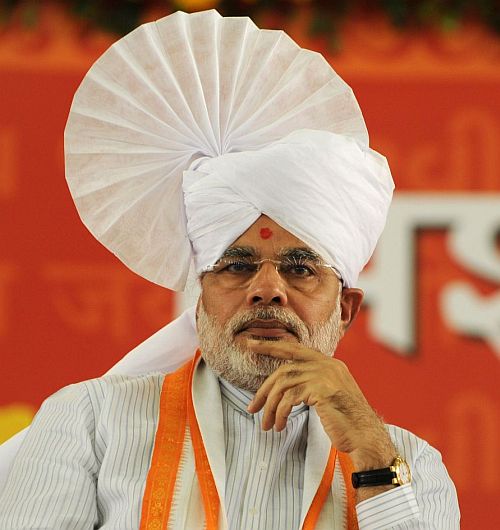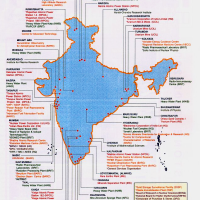T.K.ARUN. TNN, T K ARUN
TNN, T K ARUN
Narendra Modi should not become the prime minister, because that would destroy the idea of India as a nation that celebrates unity in diversity, where multiple identities prosper in harmony and dignity. Equally, democracy and the rule of law would be casualties under Modi. For the BJP, Modi’s ascent to the top would mean a hasty end to any hope of evolving into a centre-right party minus a Hindu majoritarian agenda.
The tutored rants of a pseudo-secular hack who cannot see the glory of growth, prosperity and social harmony achieved in Gujarat under Modi’s leadership? That, of course, would be the typical reaction of Modi’s fan following, whose ardour only grows with every objection to their leader’s elevation to the pinnacle of power. But passion and protest are no substitute for the analysis of hard facts.
Gujarat has indeed prospered under Modi. Modi is an able administrator, gives scope for innovative ideas from bright sparks in the bureaucracy to be deployed on the ground. He has been able to curb petty corruption at the retail level. The state has a viable power sector and everyone pays his bill. All this is true.
Much of it is true for other states as well, except for the success story in power. Bihar has grown faster than Gujarat, Tamil Nadu and Maharashtra more or less match its growth rates. And Gujarat lags in reducing poverty, showing that the growth it achieves is rather lopsided. Women have a raw deal, with high levels of anaemia and low levels of college education, compared to several other states.
Gujaratis are an enterprising people, have been the most enthusiastic in taking advantage of liberalisation and globalisation and have propelled economic growth in their state. The chief minister certainly can take credit for not standing in the way but even more certainly cannot take credit for the Gujarati business acumen accumulated over history.
But Modi’s vaunted achievement is not just to have led growth. There is no denying his charisma as a leader, the conviction and force with which he speaks and his ability to move his audience with oratory.
Leadership power, unfortunately, is not an automatic argument in his favour. What he leads his followers to becomes all the more important, the more inspirational he is as a leader. And this is where the rub is. What he believes in, what he has practised, is extremely divisive, inimical to liberal democracy.
Modi is not on the best terms with the Rashtriya Swayamsevak Sangh. This is not because the Sangh suspects him of any ideological deviation. Rather, Modi personifies the Sangh’s belief system. The problem is that Modi is too authoritarian to accept the discipline even of the Sangh. This authoritarian streak has manifested itself as quashing of dissent and fostering of leaders like Amit Shah, prime accused in encounter killings, extortion rackets.
It is not factually true that there have been no attacks on Muslims in Gujarat after the pogroms of 2002, but there has been relative peace. Under his government, the Sangh Parivar has taught the Muslims of Gujarat to live as second class citizens, their safety and security guaranteed not so much by the commitment of the state to protect the rights of citizens as by patronage conditional on good behaviour. This, indeed, was the ideal laid down by the Sangh’s Guru Golwalkar, who strongly believed that India should be the land of Hindus and followers of other religions should live here not as equal citizens under a secular constitution but as second class citizens enjoying truncated rights. The Sangh no longer says this openly but nor has it repudiated its most influential leader’s teachings. The Sangh and all the organisations it has formed and/patronised, including the BJP, propagate the myth that Hindus are an oppressed, exploited group in India while the minorities are coddled with undue benefits. This myth is used to fan hatred towards non-Hindus and to unify Hindus on the basis of such hatred.
This attempt is inimical to democracy and peaceful coexistence of people of different faiths. It is also inimical to the traditional Hindu ethos. At the level of theology, Hinduism recognises no deviance in the pursuit of spiritual equilibrium, tantric sex and austere, ascetic, intellectual pursuit of the ultimate and everything in-between being all equally acceptable. With a pantheon that has more gods than there were Hindus at the time of Independence, Hinduism has no problem accepting a few more gods, whatever their names.
Inclusiveness with regard to multiple paths of spirituality is not the same thing as tolerance. Hindus have little tolerance when it comes to caste trespasses. That honour killings continue even today stands testimony to this form of intolerance. Yet, the philosophical core of Hinduism, advaita, lends itself to radical interpretations that negate caste and see universal humanity across nations, races and other divisions. One such interpretation was espoused by Vivekananda, whose views have little in common with the sectarian vision of the Sangh and its acolytes like Modi. For Vivekananda, all religions lead to spiritual realisation, just as all rivers lead to the ocean. For the Sangh and Modi, Muslims and Islam are anathema. This has nothing to do with Vivekananda or his thought.
Hypocrisy, intolerance and authoritarianism will become instituted in the central government, if Modi were to become prime minister. For any other BJP leader, such institutionalisation would be a risk, countered by the system’s inertia. With Modi, that would be a certainty.
India’s prosperity depends on voluntary unity of its constituent diversity. Attempts to subordinate some sections will inevitably lead to schism. The deep alienation induced by the bloody campaign to demolish the Babri mosque is still playing out as occasional terror strikes. The point is to create integration and inclusion, not further alienation that descends into civil war.
Related articles
- “Modi go back”: Protest against Narendra Modi’s Karnataka visit (kractivist.wordpress.com)
- The Language of Narendra Modi (kractivist.wordpress.com)
- Gujarat- Voice of Victims #Narendramodi (kractivist.wordpress.com)
- Gujarat and the Politics of Vendetta – Haren Pandya and Narendra Modi (kractivist.wordpress.com)
- Narendra Modi, the man and the message (kractivist.wordpress.com)









